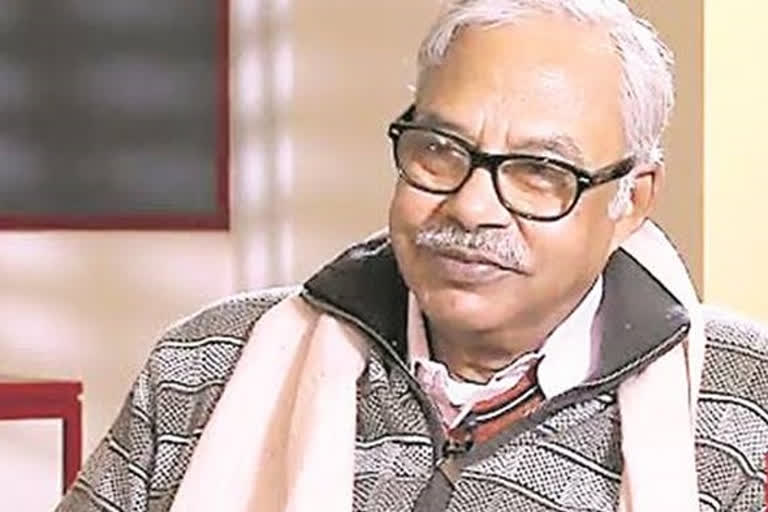New Delhi: There is no evidence to suggest that unrestrictive labour laws will help in attracting foreign investment, says CITU’s General Secretary Tapan Sen while blaming some states for compromising the welfare and safety of workers amid a nationwide lockdown to increase the profitability of the corporate sector.
“Even ILO (the International Labour Organisation), in one of the reports, had commented that the countries having liberal and unrestrictive labour laws do not have a very bright record of investment pouring in there,” said Sen.
“It is a very dubious argument, it does not have any empirical support,” he told ETV Bharat.
Several states, including Uttar Pradesh, Madhya Pradesh, Haryana, Rajasthan, Punjab and Maharashtra have either suspended or diluted their labour laws for a period of up to 1,000 days, and some other states such as Tripura and Assam have been considering similar moves.
Yogi Aditya Nath government in Uttar Pradesh issued an ordinance on Wednesday suspending most of the labour laws except the Bonded Labour Act, 1976, the Employee Compensation Act, 1923, and the Building and Other Construction Workers’ Act, 1996 and section 5 of the Payment and Wages Act.
According to reports, some other laws such as maternity act, child labour act, and equal remuneration act have also been retained. But other labour welfare laws, most importantly the Industrial Disputes Act, the Factories Act, the Minimum Wages Act, the Trade Unions Act, the Contract Labour Act, the Payment of Bonus Act, the Inter-state Migrant Workmen Act, the Working Journalists Act, and the EPF and Miscellaneous Provisions act are no longer applicable on the state.
Former Rajya Sabha member Sen told ETV Bharat that the suspension of labour laws in some BJP and other opposition ruled states is being done in two stages.
In the first stage, Gujarat, Haryana and Madhya Pradesh governments extended the maximum hours of work permitted in a week, which was followed by the opposition ruled states like Rajasthan, Punjab and Maharashtra.
The Congress is in power in Rajasthan and Punjab and it shares the power in Maharashtra with its allies Shiv Sena and NCP.
Sen also rejected the argument that these states have suspended the labour laws to attract foreign investment, particularly to attract those companies that are trying to move their production facilities out of China.
“The question is not of attracting the investment but of maximising the profit in the time of economic slowdown,” he said.
“Economy is slowing down and the corporate sector has limited opportunity to increase their profit during the period so the only area remaining for them is to minimise their labour cost and maximise their profit, there is no other goal,” added Sen.
“If the intention was to permit workers to work more in a week then these provisions are already there in the factories act,” explained the veteran trade union leader.
Suspension of Inter-state migrant workmen act hit the most vulnerable
Sen blamed the suspension of more than four decades old the Inter-state Migrant Workmen Act for the pathetic condition of migrant labourers who have been stuck in different states without any means to support them.
Following the imposition of a nationwide lockdown from March 25, hundreds of thousands of migrant workers were seen walking on foot or moving on cycles and rickshaws for several hundred kilometres to reach their native places as the lockdown hit their livelihood, leaving them in cities without any means to sustain them.
This week 16 migrant labourers were mowed down by a freight train near Aurangabad in Maharashtra after they fell asleep on the railway track on their way to Aurangabad railway station as they hoped to catch a train for Madhya Pradesh from there.
Sen said that the migrant workmen act was passed so that both the sending and receiving states will maintain a record of migrant labourers for their welfare.
"With the suspension of migrant workmen act, the migrant labourers in this country have been reduced to a non-entity," he noted.
Labour laws not to be blamed for the rise of the informal sector
Sen also rejected the argument put forward by some economists who blame a maze of labour laws for the rise of the unorganised sector in the country as a large number of employers found ways or hired through intermediaries or contractors to avoid the applicability of labour laws.
Shruti Rajagopalan, a research fellow at the Mercatus Center at George Mason University, has supported the move by some states to suspend the labour laws.
“First, UP and MP have started suspending labour regulation. This should have been done decades ago, even without COVID,” Shruti Rajagopalan wrote on her twitter handle.
“These laws, while well-intentioned, have had terrible unintended consequences of creating a monstrous unorganized sector,” she said.
The veteran labour union leader rejected the theory of blaming the labour laws for the rise of the unorganised sector in the country.
Sen also pointed out that Prime Minister Narendra Modi’s government introduced a fixed-term contract through an executive order in its first term but it has not resulted in improving the employment situation in the country.
“From 2016 to the time of the corona outbreak, has the employment situation in the country improved in any manner,” he asked.



